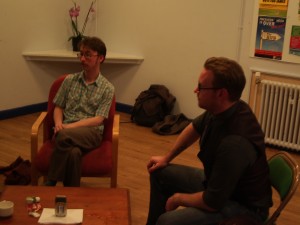Roundtable: What is the Future of Religious Studies?

After this week's podcast, which involved eight scholars giving their views on the future of Religious Studies, there was really only one way we could create a suitably collective and varied response - six postgrads sitting around a table, accompanied by pink gin and our trusty dictaphone. Conversation ranges from the public perception of what Religious Studies does, what to do with a RS degree, to the financial practicalities of doing postgraduate research in the UK and US today. Mostly, though, it's a collective rant about the cognitive study of religion (for a more educated discussion on cognitive approaches to the study of religion, see our interview with Armin Geertz)..
**Regular visitors please note - we have moved our weekly feature articles to Wednesdays instead of Fridays. This will continue until further notice, and is intended to promote more discussion**
If you are new to the podcast - this is not what we usually do. If you are a regular listener - you might enjoy this, or you might not; either way, we are back to normal with Bettina Schmidt's interview on Anthropological Approaches on Monday.
The bleeping noises are Chris's camera, and the clunks are Liam's can of Gin. We hope you enjoy it, we certainly enjoyed recording it. We'll be recording another at the SOCREL (Sociology of Religion) Annual Conference in just a few days time (with a more diverse range of participants!). If you'd like this to become a regular feature, please let us know.
Choice quotations:
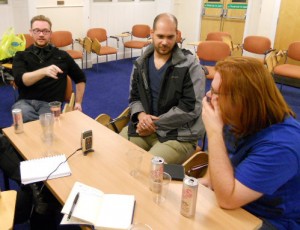
"I think of Religious Studies less as a discipline and more as the name of a department."
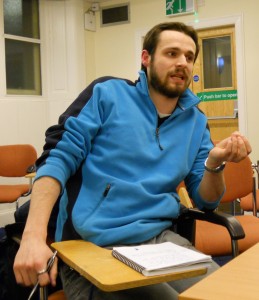
The Discussants:
Editor's Note: The author bios below have been left as they were first published in 2012.
Christopher R. Cotter recently completed his MSc by Research in Religious Studies at the University of Edinburgh, on the topic ‘Toward a Typology of Nonreligion: A Qualitative Analysis of Everyday Narratives of Scottish University Students’. He is currently taking a year out from study to pursue PhD applications, present at conferences, and work on projects such as this. His future research will continue to expand the theme of ‘non-religion’ to apply to ‘everyone’ in religiously diverse, socio-economically deprived urban environments, simultaneously deconstructing the religion-nonreligion dichotomy in the process. He is Deputy Editor and Bibliography Manager at the Nonreligion and Secularity Research Network, and currently editing the volume ‘Social Identities between the Sacred and the Secular’ with Abby Day and Giselle Vincett (Ashgate, 2013). See his personal blog, or academia.edu page for a full CV.
Ethan Quillen, Circular Academia: Navigating the Dangerous Waters of Term Re-Assignment for the Religious Studies Project.
David G. Robertson is a Ph.D. candidate in the Religious Studies department of the University of Edinburgh. His research examines how UFO narratives became the bridge by which ideas crossed between the conspiracist and New Age milieus in the post-Cold War period. More broadly, his work concerns contemporary alternative spiritualities, and their relationship with popular culture. Forthcoming publications: “Making the Donkey Visible: Discordianism in the Works of Robert Anton Wilson” in C. Cusack & A. Norman (Eds.), Brill Handbook of New Religions and Cultural Production. Leiden: Brill (2012) “(Always) Living in the End Times: The “rolling prophecy” of the conspracist milieu” in When Prophecy Persists. London: INFORM/Ashgate (2012). For a full CV and his MSc thesis on contemporary gnosticism, see his Academia page or personal blog.
Liam Sutherland is a Religious Studies Postgraduate student at Edinburgh University undertaking a Masters by Research, on the relevance of E.B Tylor for the contemporary theory of religion, defining religion and modern scholars with a ‘Neo-Tylorian’ influence or affinity. He is a native of Edinburgh where he also completed his undergraduate degree in 2009, producing a dissertation on contemporary Indigenous Australian spirituality and the politics of land rights. Though he began in Politics, and took many Politics and school of Social Science courses, he quickly fell in love with Religious Studies! Liam has also written the essay An Evaluation of Harvey’s Approach to Animism and the Tylorian Legacy for the Religious Studies Project.
Jonathan Tuckett, What is Phenomenology? for the Religious Studies Project.
Kevin Whitesides completed his B.A. in Religious Studies at Humboldt State University. He is currently developing an MSc dissertation at the University of Edinburgh on '2012' millennialism as part of a broader emphasis on countercultural transmission. Kevin has contributed articles to 'Archaeoastronomy' and 'Zeitschrift fur Anomalistik', has contributed chapters for two anthologies on apocalypse and prophecy, and has presented widely on the '2012' milieu at academic conferences and universities.
Doing Anthropological Fieldwork
“If we want to discover what [wo]man amounts to, we can only find it in what [wo]men are: and what [wo]men are, above all other things, is various. It is in understanding that variousness – its range, its nature, its basis, and its implications – that we shall come to construct a concept of human nature that, more than a statistical shadow, and less than a primitivists dream, has both substance and truth.” (Geertz, The Interpretation of Cultures, 1973:52)
This quotation from Clifford Geertz, one of the canonical figures in anthropology, succinctly sums up what anthropology tries to do. Anthropology is essentially a comparative study of socio-cultural behaviour and attitudes, and is one of the most complex yet fundamental tools in the scholar of religions’ toolbox.
Some scholars make a career out of being an anthropologist of religion, others employ the techniques of ethnographic fieldwork in combination with other approaches and methodologies. And, of course, even those scholars who are attempting to be solely anthropologists of religion cannot divorce religion from the host of other contextual factors within which they believe they have found it. This week, David (and, briefly, Chris) are joined by Dr Bettina Schmidt of the University of Wales, Trinity St David, who gives an insightful personal account of the complex task of conducting anthropological fieldwork, with examples from a variety of contexts.
You can also download this interview, and subscribe to receive our weekly podcast, on 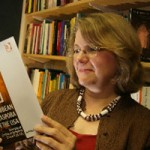 The Insider/Outsider Problem, and/or reading Katie Aston's response Insider and Outsider - An Anthropological Perspective. Anthropology is a complex beast, and something which can only truly be learned in the field. As our friend Damon Zacharias Lycourinos has said:
The Insider/Outsider Problem, and/or reading Katie Aston's response Insider and Outsider - An Anthropological Perspective. Anthropology is a complex beast, and something which can only truly be learned in the field. As our friend Damon Zacharias Lycourinos has said:
"Anthropology is the art and science of taking paradigms of ethnography from your supervisor, taking them into the field, realising that they are wrong due to their objectivity, re-shaping and introducing a new school of anthropological theory, and expecting your re-shaped paradigms to be annihilated by your future students."
Fiction-Based Religions
The majority of those who identified as a Jedi on the 2001 UK census were mounting a more-or-less satirical or playful act of non-compliance; nevertheless, a certain proportion of those were telling the truth. How does a religion constructed from the fictional Star Wars universe problematise how we conceptualise other religions, and the stories they involve? And what makes certain stories able to transcend their fictional origins and become myths?
Markus Altena Davidsen is a PhD candidate at the universities of Aarhus, Denmark and Leiden, Netherlands, and assistant lecturer in the sociology of religion in Leiden. Since 2009, he has been working on a PhD project entitled “Fiction-based Religions: The Use of Fiction in Contemporary Religious Bricolage”. In this project, Davidsen attempts to do three things. Firstly, he maps the various ways on which religious groups since the 1960s have been integrating elements from Tolkien’s literary mythology with beliefs and practices from more established religious traditions. This material is used to develop a typology of forms of religious bricolage (harmonising, domesticating, archetypal etc.) which are also at work in alternative spirituality in general. Secondly, he looks at how Tolkien religionists legitimise their religious practice (to themselves and others) given that it is based on a work of fiction. These accounts are compared with what cognitive theory has to say about narratives and plausibility construction. Thirdly, Davidsen treats how the internet has facilitated the emergence of a self-conscious spiritual Tolkien milieu. Some preliminary conclusions from the project are presented in the forthcoming article “The Spiritual Milieu Based on J.R.R. Tolkien’s Literary Mythology”, in Adam Possamai (ed.), Handbook of Hyper-real Religions, in the series Brill Handbooks on Contemporary Religion 5, Leiden & Boston: Brill, 185-204.
You can keep up with Markus's work on Invented Religions. And you may enjoy Markus and Carole's contributions to our edited episode on "The Future of Religious Studies".
Psychological Approaches to the Study of Religion
In practice, experimentation requires much effort, imagination, and resources. The subject of religion seems too complex and too ‘soft’ for the laboratory. It is filled with much fantasy and feelings, two topics which academic psychology finds hard to approach.
Beit-Hallahmi, Benjamin, and Michael Argyle. The Psychology of Religious Behaviour, Belief and Experience. London: Routledge, 1997, p. 47.
Psychology of religion involves the application of psychological methods and interpretive frameworks to religious institutions, as well as to individuals of all religious or noreligious persuasions. Last November, Chris had the pleasure of chatting to Professor Benjamin Beit-Hallahmi about the psychological approach, how one applies it to the study of religion, and the various challenges and advantages contained therein. This interview was recorded in the heart of New York City, and we can only hope that the ambient noise adds to the character of the interview.
In answer to the question “what can science say about atheism?”, Professor Beit-Hallahmi published the article “Cognitive Approaches to the Study of Religion, and Erica Salomon’s response essay.
The Secularisation Thesis
The secularisation thesis—the idea that traditional religions are in terminal decline in the industrialised world—was perhaps the central debate in the sociology of religion in the second half of the 20th century. Scholars such as Steve Bruce, Rodney Stark, and Charles Taylor argued whether religion was becoming less important to individuals, or that only the authority of religions in the public sphere was declining. Data from the US and South America, however, began to challenge many of their basic assumptions. Professor Linda Woodhead joins us to discuss the background and legacy of the secularisation thesis.
A transcription of this interview is also available as a PDF.
Religion After Darwin
Charles Darwin's On The Origin of Species was published in 1859, and had an immediate and dramatic effect on religious narratives. Traditional religions were forced to adopt an evolutionary worldview, or to go on the offensive; whereas New Religious Movements like Wicca or New Age adopted an environmental concern as a central part of their belief. And possibly, for individuals and groups committed to protect, preserve or sacralise nature, environmentalism has become a kind of religion in itself.

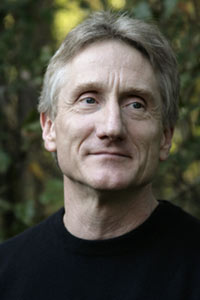 Bron Taylor is Professor of Religion and Nature at the University of Florida. He is also a Carson Fellow at the Rachel Carson Center at Ludwig-Maximilians-Universität München. His central scholarly interest and personal passion is the conservation of the earth’s biological diversity and how human culture might evolve rapidly enough to arrest and reverse today’s intensifying environmental and social crises. He edits the Journal for the Study of Religion, Nature and Culture, as well as the two-volume Encyclopedia of Religion and Nature. His latest book is Dark Green Religion: Nature Spirituality and the Planetary Future (2009) - the first chapter can be read on his website, along with a wealth of other supplimentary material including a piece on Bron's thoughts on the movie Avatar, as discussed in the podcast
Bron Taylor is Professor of Religion and Nature at the University of Florida. He is also a Carson Fellow at the Rachel Carson Center at Ludwig-Maximilians-Universität München. His central scholarly interest and personal passion is the conservation of the earth’s biological diversity and how human culture might evolve rapidly enough to arrest and reverse today’s intensifying environmental and social crises. He edits the Journal for the Study of Religion, Nature and Culture, as well as the two-volume Encyclopedia of Religion and Nature. His latest book is Dark Green Religion: Nature Spirituality and the Planetary Future (2009) - the first chapter can be read on his website, along with a wealth of other supplimentary material including a piece on Bron's thoughts on the movie Avatar, as discussed in the podcast
Historical Approaches to (Losing) Religion
How can we use historical approaches in the study of religion? More specifically, can we use historical approaches to understand why people are losing it? Professor Callum Brown tells us why historical approaches have much to tell us about religious change.
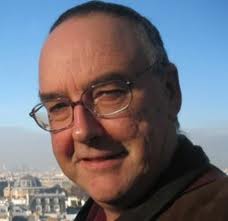 Callum Brown is Professor of Religious and Cultural History at the University of Dundee. He is a social and cultural historian with special research interests in religion and secularisation in the post 1750 period - especially in the 20th and 21st centuries - mostly in Scotland and Britain, but also Canada, USA and Ireland.
Callum Brown is Professor of Religious and Cultural History at the University of Dundee. He is a social and cultural historian with special research interests in religion and secularisation in the post 1750 period - especially in the 20th and 21st centuries - mostly in Scotland and Britain, but also Canada, USA and Ireland.
He is currently involved in the project A Social and Cultural History of Modern Humanism, covering Scotland, UK, Ireland, Canada and USA and using especially oral history focusing on the social and cultural origins of individuals' humanism, looking at issues like family background, religious experiences, and cultural alignments. He is also about to publish Religion and the Demographic Revolution: Women and Secularisation in Canada, Ireland, UK and USA since the 1960s (London, Boydell & Brewer), which looks at demographic behaviour in the North Atlantic world, and the correlations between gender change, the sexual revolution, changes in patterns of marriage and cohabitation, and changes in religious ritual (such as religious solemnisation of marriage, baptism and funeral rites), and incorporates considerable statistical research.
You may also be interested in our recent interview with Professor Linda Woodhead on the Secularisation Thesis, and Bjoern Mastiaux's essay on the same topic.
For an interesting response essay to this podcast, please see Tim Hutchings' A Response to Callum Brown: Connecting “When” and “Why” in Digital Religion. For a more 'informal' response, you can listen to our roundtable discussion session on the question Can We Trust the Social Sciences?.
Roundtable: Can We Trust the Social Sciences?
We have another ‘treat’ for you this week – we’ll let you decide whether that was an accurate description or not – in the form of another roundtable discussion, with a slightly different group of people. This was recorded late on the 28th of March at the University of Chester during the British Sociological Association’s Sociology of Religion Study Group (SOCREL for short)’s conference (although, of course, this is an ‘unofficial’ discussion).
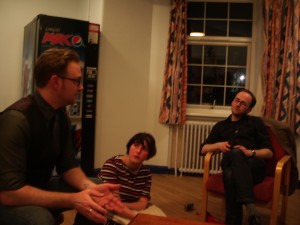
The topic of discussion grew out of a presentation delivered by Callum Brown at the University of Edinburgh (at the same time as we recorded our podcast with him) on the topic of “People of no religion: The demographics of secularisation in the English speaking world since 1900”, which presented, amongst other things, some conclusions from large-scale demographic surveys of religious identification. Ethan Quillen disagreed forcefully that conclusions drawn from questionnaires and censuses can be used to draw large-scale conclusions, and tabled the motion, "Can We Trust the Social Sciences?"
If you are new to the podcast – this is not what we usually do. If you are a regular listener – you might enjoy this, or you might not; either way, we are back to normal with Jolyon Mitchell’s interview on Religion, Media and Violence on Monday. For an interesting and more rigorous response essay to this podcast, please see Tim Hutchings' A Response to Callum Brown: Connecting “When” and “Why” in Digital Religion.
Conversation ranges from the strengths and weaknesses of such data, whether there is more to the social sciences than quantitative methods, and the place of the social sciences within a multi-disciplinary Religious Studies field. Can we trust social sciences when we study religion? Is a social scientific approach the future of religious studies? What is an alternative to a social scientific approach? These questions and more form the basis for what we intend to act as a bridge between our previous roundtable (“What is the Future of Religious Studies?”) and our forthcoming roundtable (“Should scholars of religion be critics or caretakers?”), timetabled for release on 6 June 2012.
Discussion largely focussed upon Quantitative Methods… something which future podcasts with Ariela Keysar and David Voas shall be focusing on more explicitly:
Do social scientists depend upon assumptive reasoning when it comes to filling in the blanks in their data? Does a decline in church attendance mean a decline in conviction, or simply a decline in one’s attendance at church? By providing boxes do we force people into boxes? What does one individual tell us about a category? What is it specifically about religion that makes this such an issue? How do we trust people to answer in a certain way?
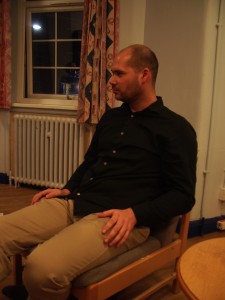
Reference is made to the panel session on Religious Conspiracies at which David, Kevin and Ethan had presented earlier in the day. We also refer to Tom Rees’ excellent Epiphenom blog. Ethan plays Devil’s advocate, whilst Chris throws himself on the pyre and asks Ethan what he thought was wrong with his approach in his MSc Thesis.
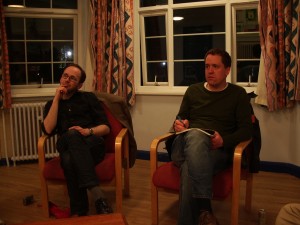
It was late… two thirds of the panel had been up since 7 am travelling down from Edinburgh.
The conclusion? Should there be a balance between quantitative and qualitative approaches? Well… yes. But individual scholars may have to side with one or the other. We need a holistic approach, and this isn’t generally something one scholar can accomplish by themselves…
Sponsored by Pepsi Max, and pink gin.
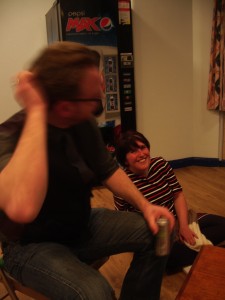
The Discussants:
Katie Aston
 Having completed a BA (hons) in Fine Art at Wimbledon School of Art in 2006, Katie went on to complete her Masters in Social Anthropology at Goldsmiths University, with a dissertation investigating gender performance within contemporary Stand Up comedy in London. Building on a pilot study of the Atheist Bus Campaign, she is currently undertaking an ethnographic study of non-religious value construction and material cultures. She is looking specifically at rationalism and the role Christian heritage within non-religious individuals and organisation, taking a historical perspective from the freethought archives of Bishopsgate Institute. Katie is an Assistant Editor at NSRN Online, the web presence of the Nonreligion and Secularity Research Network.
Having completed a BA (hons) in Fine Art at Wimbledon School of Art in 2006, Katie went on to complete her Masters in Social Anthropology at Goldsmiths University, with a dissertation investigating gender performance within contemporary Stand Up comedy in London. Building on a pilot study of the Atheist Bus Campaign, she is currently undertaking an ethnographic study of non-religious value construction and material cultures. She is looking specifically at rationalism and the role Christian heritage within non-religious individuals and organisation, taking a historical perspective from the freethought archives of Bishopsgate Institute. Katie is an Assistant Editor at NSRN Online, the web presence of the Nonreligion and Secularity Research Network.
Christopher R. Cotter
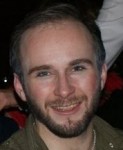 Chris recently completed his MSc by Research in Religious Studies at the University of Edinburgh, on the topic ‘Toward a Typology of Nonreligion: A Qualitative Analysis of Everyday Narratives of Scottish University Students’. He is currently taking a year out from study to pursue PhD applications, present at conferences, and work on projects such as this. His future research will continue to expand the theme of ‘non-religion’ to apply to ‘everyone’ in religiously diverse, socio-economically deprived urban environments, simultaneously deconstructing the religion-nonreligion dichotomy in the process. He is Deputy Editor and Bibliography Manager at the Nonreligion and Secularity Research Network, and currently editing the volume ‘Social Identities between the Sacred and the Secular’ with Abby Day and Giselle Vincett (Ashgate, 2013). See his personal blog, or academia.edu page for a full CV.
Chris recently completed his MSc by Research in Religious Studies at the University of Edinburgh, on the topic ‘Toward a Typology of Nonreligion: A Qualitative Analysis of Everyday Narratives of Scottish University Students’. He is currently taking a year out from study to pursue PhD applications, present at conferences, and work on projects such as this. His future research will continue to expand the theme of ‘non-religion’ to apply to ‘everyone’ in religiously diverse, socio-economically deprived urban environments, simultaneously deconstructing the religion-nonreligion dichotomy in the process. He is Deputy Editor and Bibliography Manager at the Nonreligion and Secularity Research Network, and currently editing the volume ‘Social Identities between the Sacred and the Secular’ with Abby Day and Giselle Vincett (Ashgate, 2013). See his personal blog, or academia.edu page for a full CV.
Matthew Francis
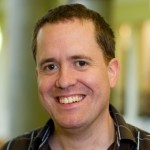 Matthew graduated from Leeds with a joint-honours degree in Philosophy and Theology and Religious Studies. He subsequently undertook a Masters by Research, where he examined the ideas of Georges Bataille in relation to the problem of meaning in death in contemporary society. Matthew is the Postgraduate Officer for the Sociology of Religion study group (SocRel) of the British Sociological Association (BSA). He has taught on undergraduate and postgraduate modules on subjects including the Sociology of Religion and Religion in Modern Britain.
Matthew graduated from Leeds with a joint-honours degree in Philosophy and Theology and Religious Studies. He subsequently undertook a Masters by Research, where he examined the ideas of Georges Bataille in relation to the problem of meaning in death in contemporary society. Matthew is the Postgraduate Officer for the Sociology of Religion study group (SocRel) of the British Sociological Association (BSA). He has taught on undergraduate and postgraduate modules on subjects including the Sociology of Religion and Religion in Modern Britain.
Matthew recently completed an AHRC-funded PhD at Leeds, which investigated the move to violence in the beliefs of groups. He is the editor for RadicalisationResearch.org, an AHRC/ESRC funded website which provides a resource for policy-makers and the media on radicalisation and extremism, and works at Goldsmiths University managing the Religious Literacy Leadership Project.
Ethan Quillen
 Circular Academia: Navigating the Dangerous Waters of Term Re-Assignment for the Religious Studies Project.
Circular Academia: Navigating the Dangerous Waters of Term Re-Assignment for the Religious Studies Project.
David G. Robertson
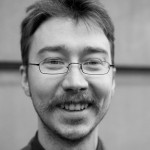 David G. Robertson is a Ph.D. candidate in the Religious Studies department of the University of Edinburgh. His research examines how UFO narratives became the bridge by which ideas crossed between the conspiracist and New Age milieus in the post-Cold War period. More broadly, his work concerns contemporary alternative spiritualities, and their relationship with popular culture. Forthcoming publications: “Making the Donkey Visible: Discordianism in the Works of Robert Anton Wilson” in C. Cusack & A. Norman (Eds.), Brill Handbook of New Religions and Cultural Production. Leiden: Brill (2012) “(Always) Living in the End Times: The “rolling prophecy” of the conspracist milieu” in When Prophecy Persists. London: INFORM/Ashgate (2012). For a full CV and his MSc thesis on contemporary gnosticism, see his Academia page or personal blog.
David G. Robertson is a Ph.D. candidate in the Religious Studies department of the University of Edinburgh. His research examines how UFO narratives became the bridge by which ideas crossed between the conspiracist and New Age milieus in the post-Cold War period. More broadly, his work concerns contemporary alternative spiritualities, and their relationship with popular culture. Forthcoming publications: “Making the Donkey Visible: Discordianism in the Works of Robert Anton Wilson” in C. Cusack & A. Norman (Eds.), Brill Handbook of New Religions and Cultural Production. Leiden: Brill (2012) “(Always) Living in the End Times: The “rolling prophecy” of the conspracist milieu” in When Prophecy Persists. London: INFORM/Ashgate (2012). For a full CV and his MSc thesis on contemporary gnosticism, see his Academia page or personal blog.
Kevin Whitesides
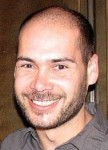 Kevin Whitesides completed his B.A. in Religious Studies at Humboldt State University. He is currently developing an MSc dissertation at the University of Edinburgh on ’2012′ millennialism as part of a broader emphasis on countercultural transmission. Kevin has contributed articles to ‘Archaeoastronomy’ and ‘Zeitschrift fur Anomalistik’, has contributed chapters for two anthologies on apocalypse and prophecy, and has presented widely on the ’2012′ milieu at academic conferences and universities.
Kevin Whitesides completed his B.A. in Religious Studies at Humboldt State University. He is currently developing an MSc dissertation at the University of Edinburgh on ’2012′ millennialism as part of a broader emphasis on countercultural transmission. Kevin has contributed articles to ‘Archaeoastronomy’ and ‘Zeitschrift fur Anomalistik’, has contributed chapters for two anthologies on apocalypse and prophecy, and has presented widely on the ’2012′ milieu at academic conferences and universities.
Jolyon Mitchell on Religion, Violence and the Media
Discussions of religion in the media nowadays frequently revolve around issues of violence and social unrest. Religions and media can become collaborators in promoting peace and opening negotiations; at the same time the media can become host to extremist narratives which may incite violence. Does the media have a responsibility to promote peace? Are religions becoming more skilled at manipulating the media?
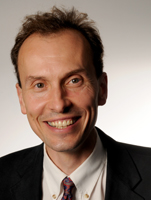 Before being appointed to the University of Edinburgh, Jolyon Mitchell worked as a producer and journalist for BBC World Service and BBC Radio 4. As Director of the Centre for Theology and Public Issues he directs a number of research projects and helps to host a wide range of public lectures and events.
Before being appointed to the University of Edinburgh, Jolyon Mitchell worked as a producer and journalist for BBC World Service and BBC Radio 4. As Director of the Centre for Theology and Public Issues he directs a number of research projects and helps to host a wide range of public lectures and events.
 His latest book, which this interview was structured around, is Promoting Peace, Inciting Violence (Routledge, to be published in Sept. 2011). Earlier publications include The Religion and Film Reader (co-editor with S. Brent Plate Routledge, 2007), and Mediating Religion: Conversations in Media, Religion and Culture (co-editor with Sophia Marriage, Continuum, 2003). Prof Mitchell is also co-editor of three research monograph series with Routledge, including on Media, Religion and Culture; and on Film and Religion. He was director of the Third International Conference on Media, Religion and Culture, Edinburgh, July 1999 and director of the Fourth International Conference on Peacemaking in the World of Film: from Conflict to Reconciliation, Edinburgh, July 2007.
His latest book, which this interview was structured around, is Promoting Peace, Inciting Violence (Routledge, to be published in Sept. 2011). Earlier publications include The Religion and Film Reader (co-editor with S. Brent Plate Routledge, 2007), and Mediating Religion: Conversations in Media, Religion and Culture (co-editor with Sophia Marriage, Continuum, 2003). Prof Mitchell is also co-editor of three research monograph series with Routledge, including on Media, Religion and Culture; and on Film and Religion. He was director of the Third International Conference on Media, Religion and Culture, Edinburgh, July 1999 and director of the Fourth International Conference on Peacemaking in the World of Film: from Conflict to Reconciliation, Edinburgh, July 2007.
Studying “Cults”
Although "cult" and "sect" are used as technical terms in religious studies, in their popular usage, "cult" tends to refer to a New Religious Movement [NRM] or other group whose beliefs or practices are considered reprehensible. Since such pejorative attitudes are generally considered inappropriate for the academic study of religion, scholars have tended to adopt the nomenclature of NRMs to refer to "a wide range of groups and movements of alternative spirituality, the emergence of which is generally associated with the aftermath of the 1960s counter-culture" (Arweck 2002:269). In this interview with Chris, Emeritus Professor Eileen Barker (LSE) takes us through the academic study of NRMs from the 1960s onwards, engaging with the particular challenges and successes which have been encountered by academics in the field, and reflecting on some of the more colourful aspects of this area of research.
Eileen Barker OBE, FBA, is Emeritus Professor of Sociology with special reference to the study of Religion at the London School of Economics. She has been researching minority religions and the responses to which they give rise since the early 1970s. Her study of conversion to the Unification Church for her PhD, led to an interest in a wide variety of movements, and she has personally studied, to greater or lesser degree, over 150 different groups. She has over 300 publications, translated into 27 languages. She travels extensively for research purposes, particularly in North America, Europe and Japan, and, since collapse of the Berlin Wall, in Eastern Europe and, more recently, China. She was the first non-American to be elected President of the Society for the Scientific Study of Religion.
She is also the founder of INFORM (Information Network, Focus on Religious Movements), an independent charity that was founded in 1988 with the support of the British Home Office and the mainstream Churches. It is based at the London School of Economics. According to Inform's website, "the primary aim of Inform is to help people by providing them with information that is as accurate, balanced, and up-to-date as possible about alternative religious, spiritual and esoteric movements."
Among Professor Barker's publications, the following may be of interest (those which are open-access are indicated with an asterisk):
- (2011) "The Cult as a Social Problem" in Religion and Social Problems, Titus Hjelm (ed.), New York & London: Routledge, 198-212.
- (2010) “Misconceptions of the Religious “Other”: The Importance for Human Rights of Objective and Balanced Knowledge”, International Journal for the Study of New Religions, Vol. 1 No. 1: 5-25.
- (2009) “In God’s Name: Practicing Unconditional Love to the Death” in Dying for Faith: Religiously Motivated Violence in the Contemporary World, Madawi Al-Rasheed and Marat Shterin (eds.), London: I.B. Tauris: 49-58.
- (2009) “New and Nonconventional Religious Movements: Implications for Social Harmony” The Review of Faith & International Affairs, Washington DC, Fall, 7/3: 3-10.
- Barker, E., ed. (2008) The Centrality of Religion in Social Life: Essays in Honour of James A. Beckford. Aldershot: Ashgate.
- *Barker, E., (2006) 'What should we do about the Cults? Policies, Information and the Perspective of INFORM', in The New Religious Question: State Regulation or State Interference? (La nouvelle question religieuse: Régulation ou ingérence de l'État?), P. Côté and T.J. Gunn, Editors. Peter Lang: Brussels. p. 371-395.
- Barker, E. and M. Warburg, eds. (1998) New Religions and New Religiosity. Aarhus: Aarhus University Press.
- *Barker, E. (1995) "The Scientific Study of Religion? You Must be Joking!" Journal for the Scientific Study of Religion 34(3): 287-310. Reprinted in Lorne L. Dawson (ed.) Cults in Context: Readings in the Study of New Religious Movements, Piscataway, NJ: Transaction, 1998: 5-28; and in The ‘Cult’ Controversy: A Reader (RST2255), edited by The University of South Africa. Muckleneuk, Pretoria: University of South Africa, 2009: 1-24. Available at: http://dialogueireland.files.wordpress.com/2010/05/barkerpaper1995ocr.pdf.
- Barker, E. (1989) New Religious Movements: A Practical Introduction. London: HMSO.
- Barker, E. (1984) The Making of a Moonie: Choice or Brainwashing?Oxford: Blackwell. Now available from Aldershot: Ashgate



